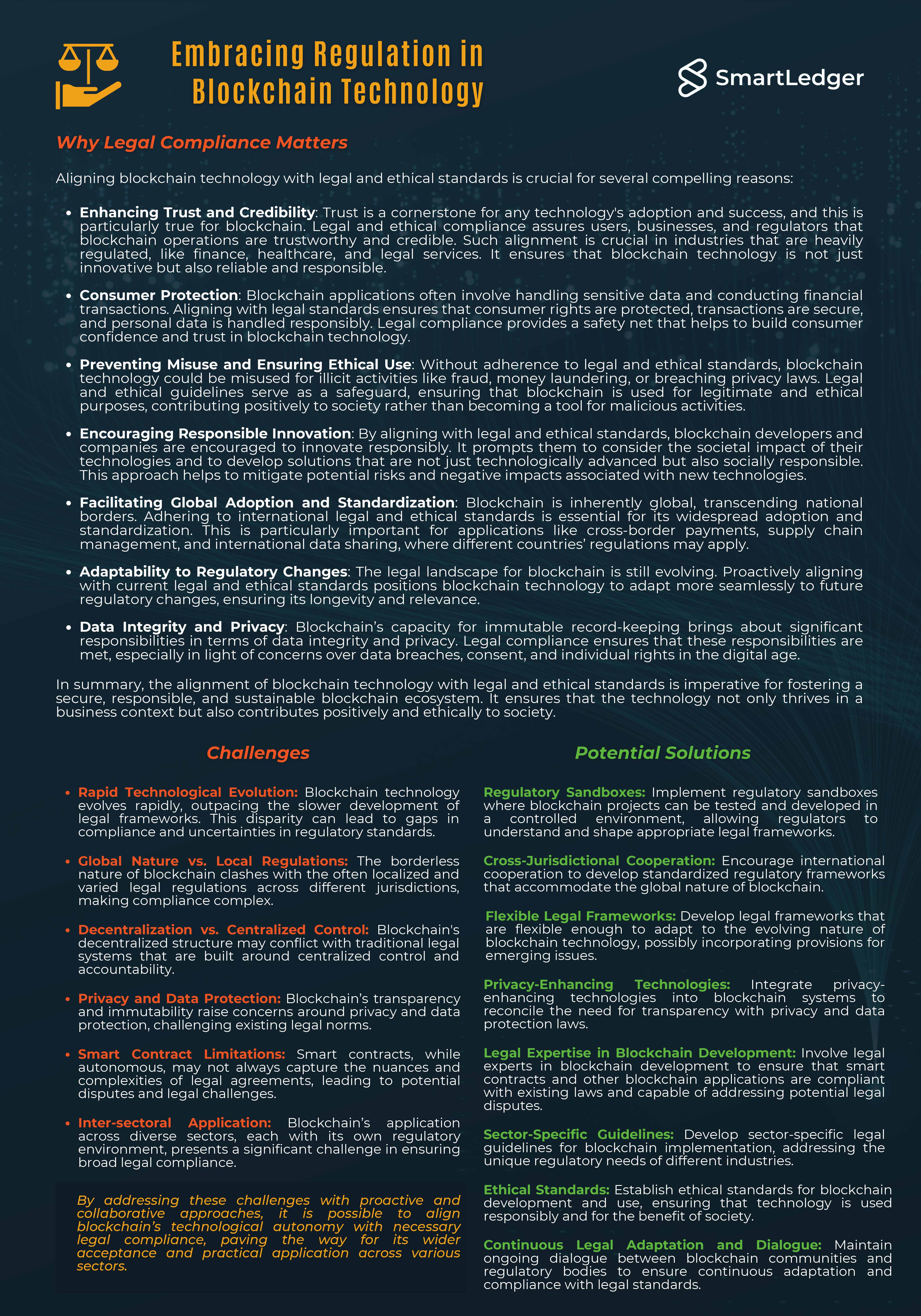|
Getting your Trinity Audio player ready...
|
This piece, first published on the SmartLedger site, is co-written with Greg Ward, Chief Development Officer at SmartLedger. Read the original post here and connect with Greg Ward and Bryan Daugherty on LinkedIn to learn more about SmartLedger’s suite of products.
The strategic imperative of legal compliance in blockchain technology
In the dynamic world of blockchain technology, legal compliance emerges not merely as a peripheral requirement but as a fundamental cornerstone that underpins the trust, legitimacy, and reliability essential for the technology’s acceptance and integration into the mainstream. This article delves into the multifaceted role of legal compliance in the blockchain sphere, underscoring its significance as a strategic enabler rather than a constraint, drawing parallels with historical technological integrations, and highlighting the balance between blockchain’s inherent ethos and the broader legal frameworks.
The trust and legitimacy Nexus A crucial aspect of aligning blockchain technology with legal standards is the establishment of trust and legitimacy. Adherence to established legal norms transcends blockchain from being solely a technical innovation to a reliable and legitimate platform. Such conformity reassures stakeholders of the technology’s operation within societal norms and regulations, a prerequisite for its widespread acceptance. The integration of blockchain technology into various sectors hinges on this alignment, positioning it not as a disruptive force but as a reliable, accepted solution.
Consumer protection and confidence Legal compliance in blockchain plays a pivotal role in embedding layers of security and accountability, thereby safeguarding consumer interests. It encompasses measures that mitigate potential risks and malpractices in digital transactions, protecting investments, consumer data, and prioritizing rights. This framework of consumer protection is instrumental in building trust and confidence among users, a critical factor for the technology’s adoption and growth.
Ethical and social considerations Beyond technical and legal aspects, integrating ethical and social considerations into blockchain operations is vital. Legal frameworks ensure that the benefits of blockchain extend holistically and ethically to society, promoting a responsible and socially conscious approach to innovation. This integration not only supports a more inclusive and equitable advancement within the blockchain space but also reflects the technology’s commitment to societal progress and ethical standards.
Historical analogies and regulatory navigation Drawing parallels with the integration of past technologies such as automobiles and the internet, the significance of legal and regulatory navigation is evident. These analogies underscore the crucial role that legal compliance played in the acceptance and integration of these technologies into society. Similarly, for blockchain technology to gain acceptance and integration, navigating legal boundaries is indispensable.
Balancing code and compliance A critical aspect of blockchain’s evolution involves striking a balance between its intrinsic “code is law” ethos and real-world legal compliance. While blockchain emphasizes technological autonomy and self-governance, aligning with legal frameworks that reflect societal consensus and ethical standards is essential. This balance ensures that the technology remains innovative and efficient while operating responsibly within legal and moral frameworks.
Global standardization and scalability Achieving global standardization in blockchain technology is crucial for its scalability and interoperability. Uniform regulatory compliance serves as a unifying force, bridging disparate legal frameworks and enabling efficient operation across international borders. This standardization is not just a logistical advantage but a strategic necessity, empowering blockchain to realize its full potential on a global scale.
In conclusion, legal compliance stands as a strategic enabler for blockchain technology, unlocking unprecedented opportunities and reshaping industries. It establishes trust, bolsters security measures, and upholds ethical standards. As blockchain continues to evolve, navigating the complex landscape of legal compliance will be paramount for its successful integration and widespread acceptance. The journey of blockchain technology is not just one of technological advancement but also of legal acumen and ethical responsibility, ensuring its role as a transformative force in the modern digital landscape.
Contact SmartLedger for the latest blockchain information, access and expertise at 1.650.507.4250


Watch: With blockchain, the utility is becoming more and more important

 02-16-2026
02-16-2026 




